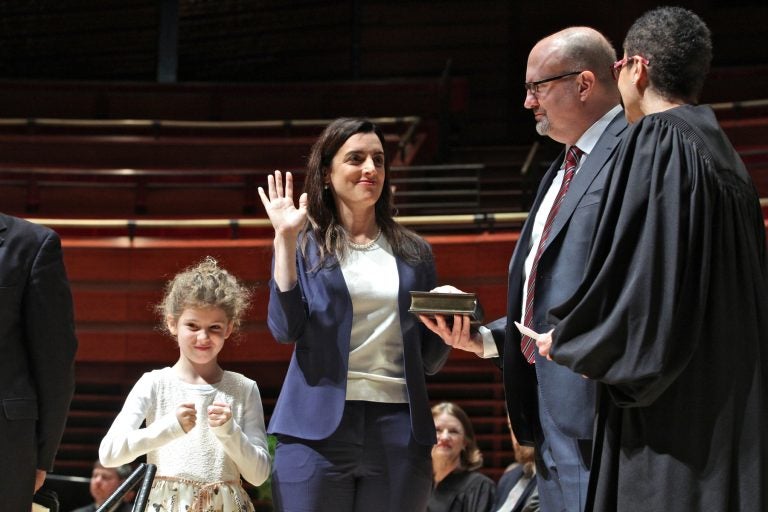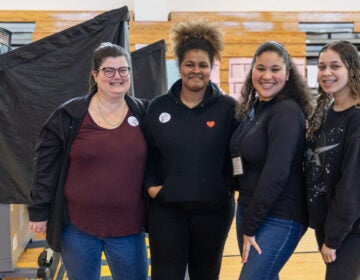Philly city controllers — going places?
Here's a look at the political prospects of the first woman to become Philadelphia controller, and the candidate she beat who seems ready to run for mayor.
Listen 4:44
Julia Bright (left) celebrates while her mother, Rebecca Rhynhart (center), is sworn in as Philadelphia city controller. (Emma Lee/WHYY)
While Philadelphia’s new District Attorney Larry Krasner took top billing at municipal inauguration ceremonies Tuesday, the event’s undercard offered plenty of interest as well.
Rebecca Rhynhart was sworn in as the first woman to become city controller, potentially launching a promising political career. Meanwhile Alan Butkovitz, the three-term incumbent she unseated, was home, perhaps planning a comeback that he hopes could take him to the mayor’s office.
Standout rookie
In her speech, Rhynhart talked about overcoming the “mediocrity and corruption” that plagues city government. She said she was motivated to run by the election of Donald Trump and “so much darkness in the landscape.”
Rhynhart’s commanding and unexpected win was significant because it represented a step forward for women in a city that needs many such steps; because it was fueled by a strong showing of younger, progressive voters; and because she humbled the city’s Democratic machine in exactly the kind of election it never loses.
Rhynhart wasn’t as compelling a speaker as Krasner, an experienced trial lawyer, but she’s new to electoral politics, and her touch is bound to improve with time.
She laid out specific goals for reform, transparency and financial savings that, if achieved, could get some attention.
An interesting aspect of Rhynhart’s ascension to the job of financial watchdog is that she’s a government insider taking a position that was conceived as an elected post specifically so the controller would have the independence to be tough on city officials.
Rhynhart served in senior financial roles for the Nutter and Kenney administrations, so it’s fair to ask whether she’ll be willing to take on her former boss.
She says she’ll have the independence to set her own course, but she also thinks she can get the administration to buy into needed changes and share credit, rather than striking an adversarial posture.
Once and future candidate?
I’d hoped to find Butkovitz at the inauguration, but he was at home for his first day without a job in like, forever.
I called him, and he said he hadn’t made a decision about running for mayor, but he ran off a list of things he thinks Kenney could be challenged on.
“Two years into [Kenney’s] four-year term, there’s still no action on the rebuilding of the playgrounds [the administration’s Rebuild initiative],” he said. “The whole experiment on pre-kindergarten is limited to 2,000 people. There’s still no program for jobs. Half the people in the city are very concerned about increases in crime and inadequate police protection.”
The Kenney administration has answers, of course. Officials note that delays in the Rebuild and pre-K programs are due to a lawsuit challenging the sweetened-beverage tax, a suit which has so far failed.
Administration communications director Lauren Hitt listed several anti-crime initiatives, including the hiring of 400 officers in the coming year, as well as steps to build job skills among citizens; the bid to bring Amazon to the city; and what she said would be a comprehensive workforce development strategy next month.
If Butkovitz takes the leap next year, we’ll see that debate play out.
It bears noting that it’s been 30 years since a Philadelphia mayor faced a credible challenge for re-election from within his own party. That was Wilson Goode in 1987, two years after the MOVE tragedy in West Philadelphia. Ed Rendell ran against him — and lost decisively.
How the politics play
Kenney won the Democratic mayoral primary in 2015 with a three-legged coalition: progressive groups; labor unions, especially construction trades that funded a super PAC to the tune of $1.5 million; and the Northwest Coalition of African-American political leaders.
I don’t see a lot of erosion among any of those constituencies.
On the other side, the key labor leader on the Kenney team, John Dougherty of the electricians’ union, is the subject of a federal investigation, so you could imagine a circumstance in which he’s unable to help.
And opponents of the soda tax are very determined and could tap a national funding base to build a campaign against Kenney.
The time to circulate nominating petitions is just 13 months away.
Is the controller’s office a launching pad?
You might think it would be, but it generally hasn’t been.
Old political hands used to tell me of a syndrome they called “controller’s disease” – the mistaken belief among city controllers that — because they hold a lot of news conferences about waste and mismanagement — the public regards them as a champion, when, in fact, most aren’t paying that much attention.
I checked today, and we’ve had seven elected controllers since 1950. Four of them — Alex Hemphill, Tom Gola, Bill Klenk, and Tom Leonard — ran for mayor and lost.
To find the one who succeeded, you have to go all the way back to 1951, when the legendary reformer, Joe Clark, became mayor from that office.
Still, a lot can happen over the next year, and maybe this will be the election in which old rules are broken.
WHYY is your source for fact-based, in-depth journalism and information. As a nonprofit organization, we rely on financial support from readers like you. Please give today.





